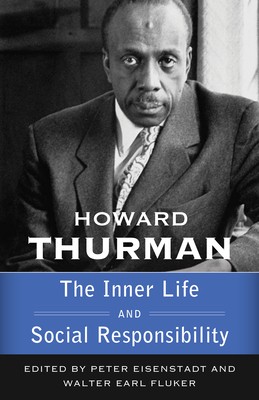
- We will send in 10–14 business days.
- Author: Howard Thurman
- Publisher: ORBIS BOOKS
- ISBN-10: 1626985545
- ISBN-13: 9781626985544
- Format: 15.2 x 22.9 x 1.3 cm, minkšti viršeliai
- Language: English
- SAVE -10% with code: EXTRA
Reviews
Description
Howard Thurman (1899-1981) was one of the leading religious thinkers of 20th century America, a mentor to Martin Luther King, Jr., and other leaders of the civil rights movement, and a mystic who pioneered influential innovations in liturgy, worship, and spirituality. Thurman's interest in politics was always, in the words of Vincent Harding, a quest for "a liberating spirituality, a way of exploring and experiencing those crucial life points where personal and societal transformation are creatively joined." Here, for the first time in print, are Thurman's sermon series on the nature of democracy, and American democracy in particular, in which he explores such topics as the meaning of human property in the Declaration of Independence, loyalty oaths and the execution of the Rosenbergs for treason during the Cold War, and the Black Power movement. Throughout these reflections Thurman explores the strivings of the disinherited, how democratic ideals can enhance individual personhood, and how, as individuals and as citizens, we can deal with the conflicts and inherent contradictions of the democratic common ground.
EXTRA 10 % discount with code: EXTRA
The promotion ends in 21d.17:46:26
The discount code is valid when purchasing from 10 €. Discounts do not stack.
- Author: Howard Thurman
- Publisher: ORBIS BOOKS
- ISBN-10: 1626985545
- ISBN-13: 9781626985544
- Format: 15.2 x 22.9 x 1.3 cm, minkšti viršeliai
- Language: English English
Howard Thurman (1899-1981) was one of the leading religious thinkers of 20th century America, a mentor to Martin Luther King, Jr., and other leaders of the civil rights movement, and a mystic who pioneered influential innovations in liturgy, worship, and spirituality. Thurman's interest in politics was always, in the words of Vincent Harding, a quest for "a liberating spirituality, a way of exploring and experiencing those crucial life points where personal and societal transformation are creatively joined." Here, for the first time in print, are Thurman's sermon series on the nature of democracy, and American democracy in particular, in which he explores such topics as the meaning of human property in the Declaration of Independence, loyalty oaths and the execution of the Rosenbergs for treason during the Cold War, and the Black Power movement. Throughout these reflections Thurman explores the strivings of the disinherited, how democratic ideals can enhance individual personhood, and how, as individuals and as citizens, we can deal with the conflicts and inherent contradictions of the democratic common ground.


Reviews